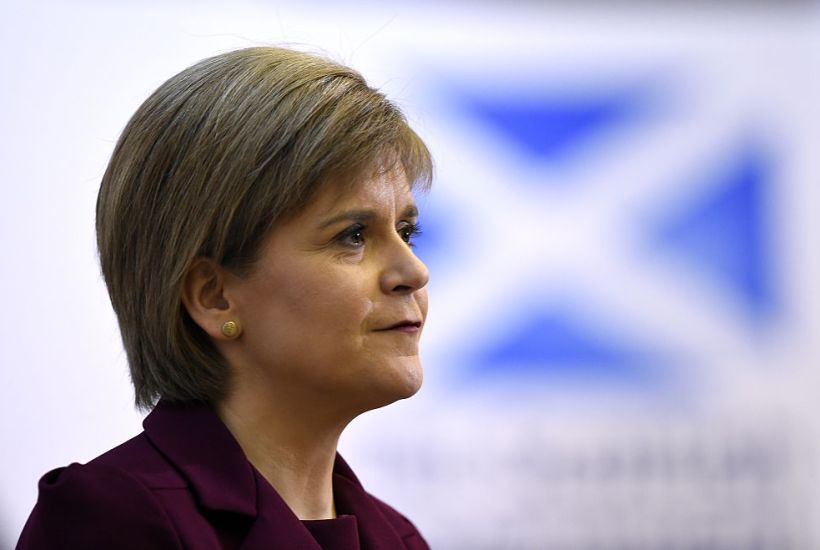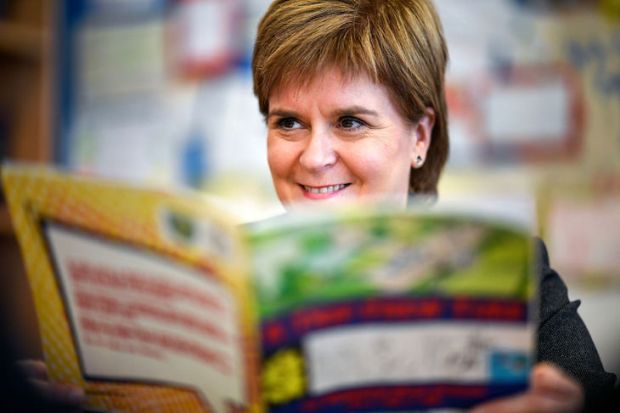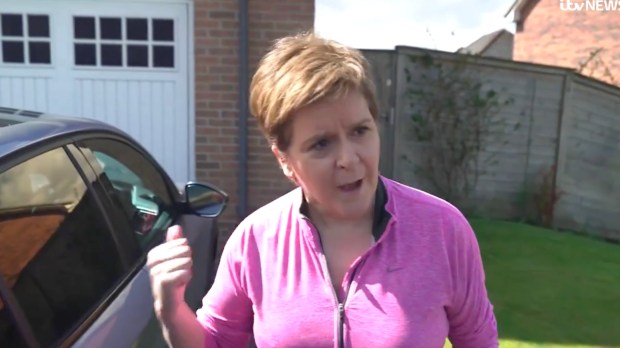Nicola Sturgeon always knew how to play the London media like a fiddle. Progressive views, plain speaking, ‘detesting’ the Tories – what was there not to like? Whenever she was in a tight corner at home, a friendly interviewer could be found in the otherwise hated imperial capital to offer an easy ride.
Much of this has been in evidence since she announced her impending resignation. Robert Peston trilled on Twitter: ‘Whether or not you back her ideas and convictions, she has been one of the most important politicians of this generation. Her call for less irrationality and hysteria in politics should be heeded.’
Her failure lay in a distinctly limited vision beyond the single cause that got her out of bed in the morning
Such panegyrics reflect a general truth that other people’s nationalisms tend to look more attractive from a distance. For those living in Scotland, the reality has been somewhat different. Over the past 20 years, nobody has worked harder than Sturgeon to entrench divisions in pursuit of a single political objective. As she heads for the exit, she has succeeded in dividing but not in delivering.
The crucial point in Sturgeon’s career was after the referendum in 2014. Until then, she had been a loyal lieutenant of Alex Salmond, her mentor and friend. She was the essential attack dog, sharp of tongue and undoubtedly effective in seeing off opponents; an essential partner in a ruthless double act.
While the Nationalists lost the referendum, they won the war on another front. To an unexpected extent, the 45 per cent who voted for independence held together as a voting bloc. This opened up a familiar path for nationalist movements – it guaranteed the party enough votes to win elections without achieving a majority for independence.
Sturgeon arrived as leader with rockstar ratings. She briefly recognised the contradiction inherent in the numbers and said another referendum was off the agenda until there was evidence of consistent 60 per cent support. The immediate task would be to demonstrate competence in government, to encourage confidence in independence.
If she had held to that, and taken her followers with her, Scotland might be a very different place today. But this long-haul strategy was never an option for a leader as combative as Sturgeon. Even before Brexit, her strategy had reverted to demanding another referendum while creating conflict with the Tory government.
After Brexit, the circumstances could scarcely have seemed more propitious for the SNP. Brexit was opposed by most Scottish voters and the Tories were down to 20-odd per cent in the polls. In spite of all that, Sturgeon did not do enough convincing. There has been no serious attempt to address the big economic questions of Scexit and support for independence has not significantly moved.
Instead, division became entrenched and Sturgeon was its symbol. The perception, often well justified, was that everything she did and said was based on a calculation about the constitution, rather than what made sense for Scotland. Acting in Scotland’s interest might mean, perish the thought, working collaboratively with people of a different political persuasion. Sturgeon’s politics revolved around one contrived ‘row’ after another.
This might have been more persuasive to her domestic audience if the mainstays of devolved politics were going well; if the SNP could present impressive evidence of competence as a radical, reforming government in deed as well as word. On these fronts, the opposite was the truth, as has been shown by the steady flow of depressing statistics on educational attainment, the NHS, drug deaths, poverty gaps and all the rest of it.
So Sturgeon remained stuck in the same statistical rut – with enough votes to win elections but no closer to delivering independence. The UK government continued, quite rightly, to refuse another referendum and few outside her core vote seemed to mind. Sturgeon’s attempt to square this circle was, to anyone paying attention, delusional.
Her plan to fix this had three parts. First, claim that the Scottish parliament had the right to call a referendum. Second, go to the Supreme Court in indignation and lose, thereby provoking the outrage of a thwarted people. Third, say that if we can’t do that then we’ll treat the next general election as a ‘de facto referendum’. The last of these, it gradually dawned on even the most faithful courtiers, was a nonsensical dead-end – a factor that might have contributed to Sturgeon’s sudden adieu. A special SNP conference next month to confirm this ‘strategy’ will now probably be abandoned.
What explains Sturgeon’s abrupt departure? The ‘de facto’ wheeze had run its course. Her promotion of gender self-identification without regard for the consequences or public opinion proved a political disaster. There’s the whiff of financial scandal, though that remains in the realms of theory rather than proof.
Sturgeon had a unique opportunity to use the powers of devolution to move Scotland forward on many fronts. Her failure lay in a distinctly limited vision beyond the single cause that got her out of bed in the morning. And even that is stuck exactly where it was when she took over.
She divided Scotland in a way that ran through every branch of Scottish society. Any challenges were closed down and positions of power were given to trusted allies. The trough of public funding bought off huge areas of civic and cultural Scotland. There has been nothing in Sturgeon’s rule to persuade the doubter that independence might create a better nation, at peace with itself.
As a friend with a long background in public service messaged me on Wednesday: ‘She drained every semblance of humour and camaraderie from public and political life. Scotland should be rejoicing to see the back of her.’
Got something to add? Join the discussion and comment below.
Get 10 issues for just $10
Subscribe to The Spectator Australia today for the next 10 magazine issues, plus full online access, for just $10.



















Comments
Don't miss out
Join the conversation with other Spectator Australia readers. Subscribe to leave a comment.
SUBSCRIBEAlready a subscriber? Log in